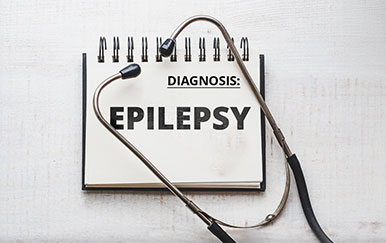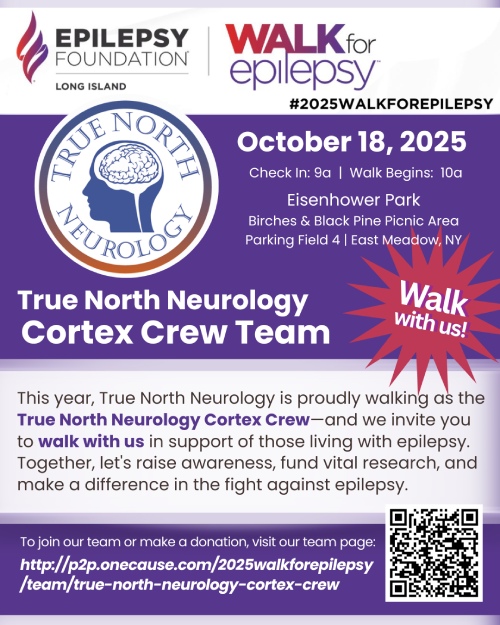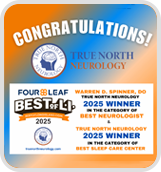Epilepsy
Why Choose True North Neurology?
-
Alan B. Ettinger, MD,
Commack
MBA, FAAN, FAESEpilepsy
Seizure -
Tanya Kapoor-Maini, DO
Shirley & Port Jefferson StationAssistant Medical Director Epileptologist
True North Neurology specializes in the treatment and management of Epilepsy and seizure disorders. Our Epilepsy specialists, Dr. Alan B. Ettinger, nationally known epilepsy specialist and award winner of the Super Doctors New York Hall of Fame and Dr. Tanya Kapoor-Maini, Assistant Director of True North Neurology specialize in Epilepsy & EMG neurodiagnostic testing. Both providers are devoted to helping our patients with seizures and related neurological disorders to receive the ,highest quality, personalized, and compassionate care. Our goal is to support each individual in managing their condition, improving their quality of life, and empowering them through education and treatment.Given the complexity of Epilepsy, our True North Neurology providers understand the importance of taking the time to acquire a detailed history to arrive at the most accurate diagnosis and treatment plan possible.

What is Epilepsy?
Epilepsy is a neurological condition that causes repeated seizures. Seizures are sudden bursts of electrical activity in the brain that can affect behavior, movement, feelings, or consciousness.
- Affects over 65 million people worldwide
- Can begin at any age
- Not contagious
- With proper care, many live seizure-free lives
Causes of Epilepsy
Epilepsy has many different causes. About half of people with epilepsy have an unknown cause. Causes of epilepsy are different for each person, and some people have no identifiable cause. In others, doctors can trace epilepsy directly to genetics, brain trauma, autoimmune disorders, metabolic issues, or infectious diseases. Each cause has different signs, diagnoses, and treatment options.
Types of Epilepsy
- Focal Epilepsy (Partial Epilepsy)
- Seizures start in one area of the brain.
- May or may not affect awareness.
Types of focal seizures:
- Focal aware seizures (formerly “simple partial”): Person is aware but may have unusual sensations or movements.
- Focal impaired awareness seizures (formerly “complex partial”): Awareness is affected, may appear confused or dazed.
- Focal to bilateral tonic-clonic seizures: Starts in one area, then spreads to both sides of the brain.
- Generalized Epilepsy
- Seizures involve both sides of the brain from the start.
- Usually affects awareness and causes body-wide symptoms.
Common generalized seizures:
- Absence seizures (staring spells, brief loss of awareness)
- Tonic-clonic seizures (stiffening, convulsions, loss of consciousness)
- Myoclonic seizures (sudden jerks or twitches)
- Atonic seizures (sudden loss of muscle tone, may cause falls)
- Tonic seizures (muscle stiffening without jerking)
- Clonic seizures (repetitive jerking)
- Combined Generalized and Focal Epilepsy
- Person has both focal and generalized seizures.
- More complex to diagnose and manage.
- Unknown Type
- When it’s not clear where the seizures start.
- Often occurs in early diagnosis before more testing is done.
Epilepsy Is Unique
Epilepsy varies from person to person. Some have multiple seizure types, and treatment plans are individualized.
Symptoms of Epilepsy
Some of the common symptoms of Epilepsy include:
- Loss of Consciousness
- Weakness
- Anxiety
- Contraction and jerking of muscles
- Confused Speech

Epilepsy is diagnosed based on a thorough medical history, physical examination, and diagnostic tests.
Medical History:
- History of seizures: Frequency, duration, triggers, symptoms
- Family history of epilepsy
- Medical conditions and medications
Physical Examination:
- Neurological exam to assess cognitive function, reflexes, and muscle strength
- Examination for signs of brain damage or structural abnormalities
Diagnostic Tests:
- Electroencephalogram (EEG): Records brain electrical activity to detect abnormal patterns associated with seizures.
- Magnetic Resonance Imaging (MRI): Creates detailed images of the brain to identify structural abnormalities or tumors that may cause epilepsy.
- Computed Tomography (CT): Similar to MRI,but provides less detailed images.
- Blood Tests: Rule out other conditions that may cause seizure-like symptoms, such as metabolic disorders or infections.
Criteria for Diagnosis:
- Two or more unprovoked seizures occurring at least 5 minutes apart
- A single seizure with a high risk of recurrence
- Evidence of brain damage or an underlying condition that is likely to cause seizures
Additional Considerations:
- Epilepsy can be idiopathic (unknown cause) or symptomatic (caused by an underlying condition).
- The type of epilepsy is determined by the pattern of seizures and the underlying cause.
- Witness accounts from family or friends can be helpful in determining the characteristics of seizures.
Note: It is important to consult with a qualified healthcare professional for an accurate diagnosis and treatment plan for epilepsy.
Treatment of Epilepsy
Managing seizures. Improving lives.
Epilepsy can often be controlled with proper treatment. The goal is to reduce or eliminate seizures while minimizing side effects.
If you or someone you know may have Epilepsy, we can help. Contact True North Neurology at Telephone Number of North Suffolk Neurology Office(631) 364-9119 or click below to schedule an appointment:
📞 Need Help or Additional Info?
Epilepsy Foundation: www.epilepsy.com
24/7 Helpline: 1-800-332-1000
Together, we can break the stigma.













